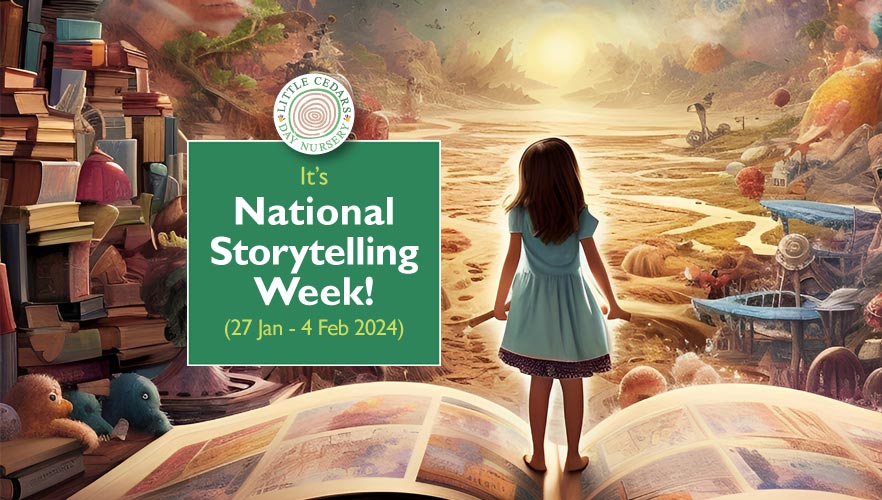
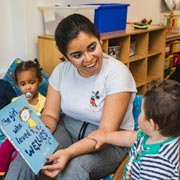 Children and families, get ready for National Storytelling Week! For 2024, storytelling in the UK is officially celebrated from Saturday the 27th of January to Sunday the 4th of February. It’s a great opportunity for children and families to get creative and to entertain one another through the sharing of stories.
Children and families, get ready for National Storytelling Week! For 2024, storytelling in the UK is officially celebrated from Saturday the 27th of January to Sunday the 4th of February. It’s a great opportunity for children and families to get creative and to entertain one another through the sharing of stories.
Storytelling is an ancient and important tradition across the globe and one that has many benefits for both the storyteller and the listener. As such, it’s something that should be encouraged amongst children of any age. Today, we take a closer look at some of those benefits and suggest ways that both kids and families can make the most of this wonderful, free activity.
Storytelling: the Perfect Antidote to Wintery Days
 National Storytelling Week couldn’t come at a better time of year. As many across the UK have witnessed in recent weeks, January brings with it cold days, dull skies, and wintery weather. Even the daylight hours are short, limiting the number of activities children can undertake outdoors. With storytelling, however, families can be transported to any number of different locations, situations and climates, all in the blink of an eye. Indeed, storytelling can take children to places and scenarios that would simply not be possible in real life. Such is the power of this art form and the human imagination.
National Storytelling Week couldn’t come at a better time of year. As many across the UK have witnessed in recent weeks, January brings with it cold days, dull skies, and wintery weather. Even the daylight hours are short, limiting the number of activities children can undertake outdoors. With storytelling, however, families can be transported to any number of different locations, situations and climates, all in the blink of an eye. Indeed, storytelling can take children to places and scenarios that would simply not be possible in real life. Such is the power of this art form and the human imagination.
Some Benefits of Taking Part in National Storytelling Week
Whether storytelling is a simple verbal activity or dramatised in some way through acting or the use of props, it can be highly entertaining and captivating. There are also a significant number of additional benefits for both the storyteller and the listener, including:
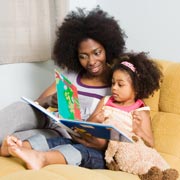 Stories stimulate imaginations;
Stories stimulate imaginations;- Storytelling enhances creativity;
- By showing what it’s like to be someone or even something else, stories nurture empathy;
- Storytelling can be a great way to relax;
- Storytelling helps to expand vocabulary and literacy;
- Storytelling helps to improve children’s speech and listening skills;
- Stories can be a great way to share new facts;
- Stories open up new worlds to children;
- Stories are a great vehicle for escapism, which is important, especially to those who have had a challenging day;
- Storytelling activities can even lead to careers involving writing or other creative jobs;
- Last but not least, storytelling is simply great fun!
So, all in all, there’s every reason for children and families to get involved in National Storytelling Week from Saturday the 27th of January to Sunday the 4th of February 2024. However, don’t stop there … storytelling is worthwhile any time of year!
How to Enhance Children’s Storytelling Sessions
If you’re an adult overseeing a storytelling session with children, perhaps start them off by telling them a short story yourself to get the ball rolling. They can learn from your example and then take turns to tell their story to the group. Making up brand new stories is beneficial (it will promote greater creativity) but it’s also OK for the youngest children to be influenced by existing stories they’re familiar with if they initially struggle to create something from scratch.
 Another great way to help children create new stories is to encourage them to be inspired by objects around them. For example, a teddy bear, toy character, or picture nearby may inspire them. This can be taken further by providing children with a basket of such props, for example, a toy animal, pine cone, toy crown, goblet, apple, and a rock. A ‘story scrapbook’ can be used by children in a similar way. Such things can significantly help children to become more creative and generate storyline ideas, sequencing, and plot twists.
Another great way to help children create new stories is to encourage them to be inspired by objects around them. For example, a teddy bear, toy character, or picture nearby may inspire them. This can be taken further by providing children with a basket of such props, for example, a toy animal, pine cone, toy crown, goblet, apple, and a rock. A ‘story scrapbook’ can be used by children in a similar way. Such things can significantly help children to become more creative and generate storyline ideas, sequencing, and plot twists.
Try encouraging questions and interaction from children who are listening. This will help to get them more involved and immersed in the storyline.
Another creative approach is to let them influence how the story should unfold by making suggestions along the way.
Hand or finger puppets can also be excellent, immersive tools to bring stories to life. Adding in some acting will add an extra layer of drama and entertainment to stories too, so encourage this. It can be taken to many different levels, perhaps with the use of different voices and accents, fancy dress to look like a character, introducing props and so on.
Why not set up a storytelling corner or nook? This can be used all year round and should be a quiet, comfortable space. Perhaps scatter cushions, blankets, and soft toys, and add fairly lights, props and, for young actors-in-the-making, costumes. A bespoke storytelling corner is sure to encourage children to come back to the activity throughout the year.
Such approaches are a recipe for a very entertaining, captivating and immersive storytelling session, which children will love! It’ll get them thinking deeply, stir their creative juices, boost their imaginations, and allow them to enter a different and magical reality for a short time. They’ll learn more about the world and gain improvements to skills like empathy and literacy along the way. Through the simple activity of storytelling, both the listener and storyteller will benefit in a myriad of ways. So — get children involved this National Storytelling Week and watch them blossom!
Little Cedars: Your Streatham Nursery & Preschool
A High-Quality Nursery in Streatham, near Furzedown, Tooting, Balham, Norbury & Colliers Wood


Are you searching for the perfect nursery or preschool for your child in or near Streatham? Little Cedars Day Nursery offers a high-quality home-from-home environment where babies, toddlers and preschoolers absolutely thrive. Rated as a Good Provider of childcare and early years education by Ofsted, Little Cedars represents a wonderful choice for families looking for the very best fit for their little ones. We also support a raft of free childcare funding schemes, making childcare more affordable for eligible families.
Get in touch today to find out about available childcare places, arrange a guided tour with your child, or ask any questions:
Our Streatham childcare nursery may also suit families living nearby in Tooting Common, Tooting, Streatham Hill, Streatham Park, Streatham Common, Furzedown, Tooting Bec, Tooting Broadway, Balham, Norbury and Colliers Wood.

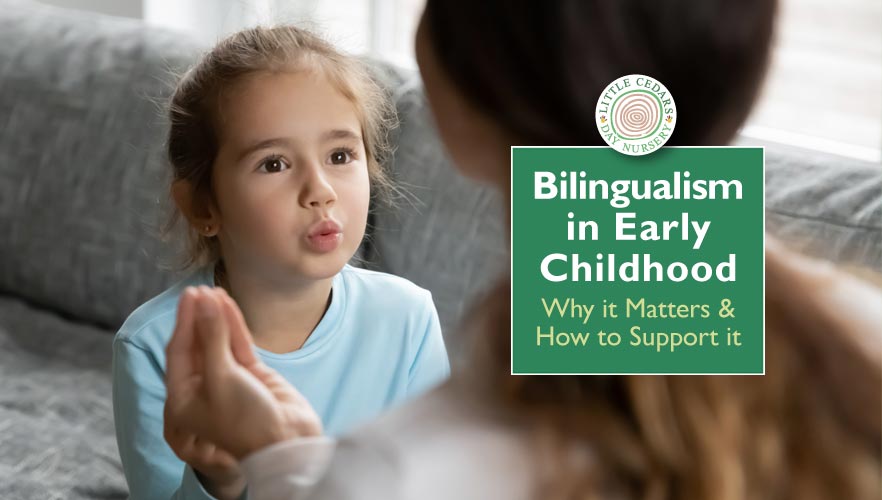
 Bilingual children have been shown to have better cognitive flexibility, focus and creativity. Studies have shown that this often leads to better decision-making, prioritisation and planning skills too. With such skills in place, bilingual children may also have a better ability to multitask and switch between separate tasks.
Bilingual children have been shown to have better cognitive flexibility, focus and creativity. Studies have shown that this often leads to better decision-making, prioritisation and planning skills too. With such skills in place, bilingual children may also have a better ability to multitask and switch between separate tasks. Young bilingual children may sometimes mix their languages or use one language inappropriately in certain contexts. This is a normal part of the language acquisition process but can be a little confusing, at times, for both the child and their caregivers.
Young bilingual children may sometimes mix their languages or use one language inappropriately in certain contexts. This is a normal part of the language acquisition process but can be a little confusing, at times, for both the child and their caregivers. Parents play a crucial role in supporting their bilingual children’s language development. To help your child become proficient in two different languages, it’s important to consistently speak both at home. Doing so can help children develop a particularly strong foundation in both languages.
Parents play a crucial role in supporting their bilingual children’s language development. To help your child become proficient in two different languages, it’s important to consistently speak both at home. Doing so can help children develop a particularly strong foundation in both languages.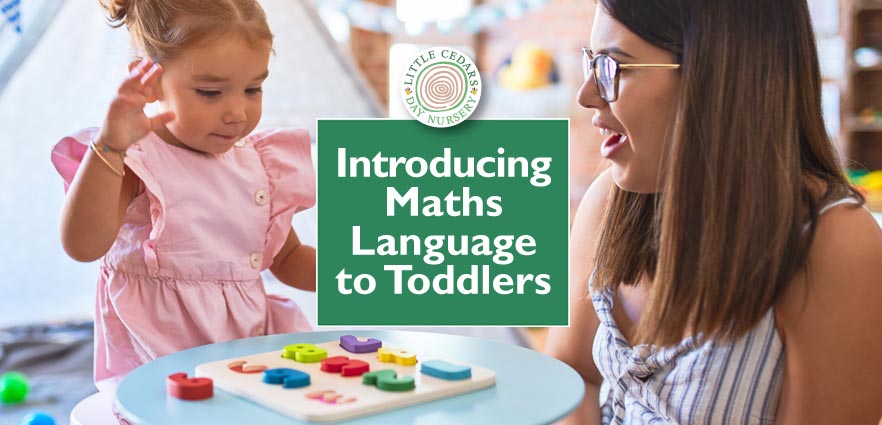
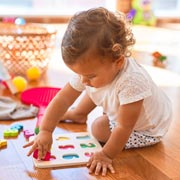 However, many children struggle with maths and have negative attitudes towards the topic. To prevent this, it is important to introduce maths concepts and vocabulary to children at a young age. Fortunately toddlers are at a period of development where they can learn and understand a range of maths words and concepts when given the opportunity. And, by introducing mathematical concepts and vocabulary to toddlers in a fun and engaging way, adults can help children develop a strong foundation in maths and foster a positive attitude towards the subject.
However, many children struggle with maths and have negative attitudes towards the topic. To prevent this, it is important to introduce maths concepts and vocabulary to children at a young age. Fortunately toddlers are at a period of development where they can learn and understand a range of maths words and concepts when given the opportunity. And, by introducing mathematical concepts and vocabulary to toddlers in a fun and engaging way, adults can help children develop a strong foundation in maths and foster a positive attitude towards the subject.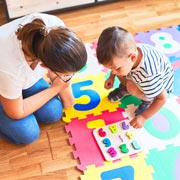 Introducing maths words and language to toddlers is all part of
Introducing maths words and language to toddlers is all part of 
 Parents and caregivers can help toddlers learn maths words and maths-related language in a variety of ways. General examples include:
Parents and caregivers can help toddlers learn maths words and maths-related language in a variety of ways. General examples include: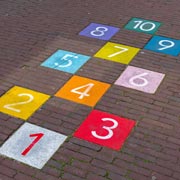 Number Hopscotch
Number Hopscotch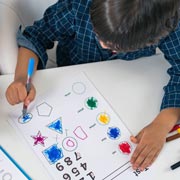 Parents can create simple patterns using objects such as blocks, toys, or coloured pencils, and ask toddlers to continue the pattern. This activity can help toddlers develop their pattern recognition skills and understand basic maths concepts such as repetition and sequencing.
Parents can create simple patterns using objects such as blocks, toys, or coloured pencils, and ask toddlers to continue the pattern. This activity can help toddlers develop their pattern recognition skills and understand basic maths concepts such as repetition and sequencing. Introducing maths words and concepts to toddlers is an important step in fostering their overall learning and development as well as in relation to success in mathematics itself. By teaching toddlers maths vocabulary and concepts at a young age, we can help them develop strong foundations in maths, enhance their cognitive development and language skills, and improve their attitudes towards maths. It is never too early to start introducing maths concepts to children, and by doing so, we can help them develop a lifelong appreciation of maths as well as nurturing a strong foundation for future success in many areas of their lives.
Introducing maths words and concepts to toddlers is an important step in fostering their overall learning and development as well as in relation to success in mathematics itself. By teaching toddlers maths vocabulary and concepts at a young age, we can help them develop strong foundations in maths, enhance their cognitive development and language skills, and improve their attitudes towards maths. It is never too early to start introducing maths concepts to children, and by doing so, we can help them develop a lifelong appreciation of maths as well as nurturing a strong foundation for future success in many areas of their lives.